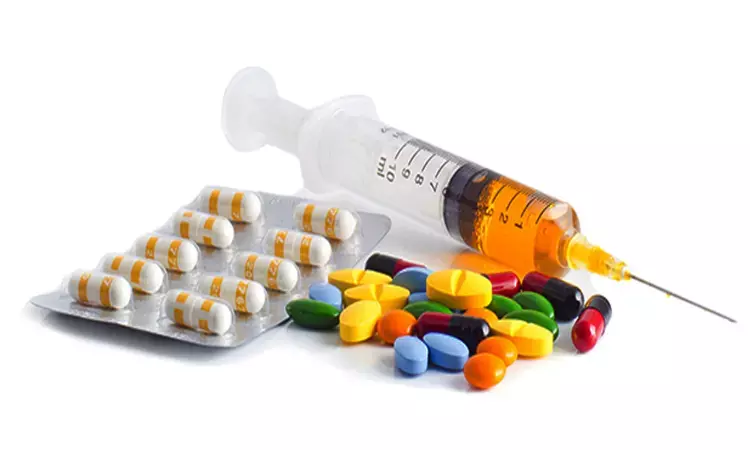- Home
- Medical news & Guidelines
- Anesthesiology
- Cardiology and CTVS
- Critical Care
- Dentistry
- Dermatology
- Diabetes and Endocrinology
- ENT
- Gastroenterology
- Medicine
- Nephrology
- Neurology
- Obstretics-Gynaecology
- Oncology
- Ophthalmology
- Orthopaedics
- Pediatrics-Neonatology
- Psychiatry
- Pulmonology
- Radiology
- Surgery
- Urology
- Laboratory Medicine
- Diet
- Nursing
- Paramedical
- Physiotherapy
- Health news
- Fact Check
- Bone Health Fact Check
- Brain Health Fact Check
- Cancer Related Fact Check
- Child Care Fact Check
- Dental and oral health fact check
- Diabetes and metabolic health fact check
- Diet and Nutrition Fact Check
- Eye and ENT Care Fact Check
- Fitness fact check
- Gut health fact check
- Heart health fact check
- Kidney health fact check
- Medical education fact check
- Men's health fact check
- Respiratory fact check
- Skin and hair care fact check
- Vaccine and Immunization fact check
- Women's health fact check
- AYUSH
- State News
- Andaman and Nicobar Islands
- Andhra Pradesh
- Arunachal Pradesh
- Assam
- Bihar
- Chandigarh
- Chattisgarh
- Dadra and Nagar Haveli
- Daman and Diu
- Delhi
- Goa
- Gujarat
- Haryana
- Himachal Pradesh
- Jammu & Kashmir
- Jharkhand
- Karnataka
- Kerala
- Ladakh
- Lakshadweep
- Madhya Pradesh
- Maharashtra
- Manipur
- Meghalaya
- Mizoram
- Nagaland
- Odisha
- Puducherry
- Punjab
- Rajasthan
- Sikkim
- Tamil Nadu
- Telangana
- Tripura
- Uttar Pradesh
- Uttrakhand
- West Bengal
- Medical Education
- Industry
Corticosteroids lower risk of kidney scarring in kids with acute pyelonephritis: Study

According to recent research published in the BMJ Journals, researchers have observed that duration 'adjuvant corticosteroid therapy' along with routine antibiotic therapy in acute febrile urinary tract infection significantly reduces the risk of kidney scarring.
Acute pyelonephritis in children may result in permanent kidney scarring that is primarily caused by inflammation during acute infection. Antibiotic therapy alone is not enough to significantly reduce kidney scarring, and adjuvant corticosteroid therapy has shown a significant reduction in inflammatory cytokines in urine prompting its evaluation in randomised controlled trials. A few clinical trials showed a trend towards a reduction in renal scarring but did not have an adequate sample size to show a significant effect.
Hence, Jitendra Meena and colleagues from the Department of Pediatrics, Post Graduate Institute of Medical Education and Research, Chandigarh, India conducted this study to synthesise the available evidence on the role of corticosteroids as adjuvant therapy in reducing kidney scarring.
Their main objective was to assess the efficacy and safety of adjuvant corticosteroid therapy for the prevention of kidney scarring in children with acute pyelonephritis.
The authors included a total of 529 children less than 18 years with acute pyelonephritis. The primary outcome was measured to evaluate the efficacy in preventing kidney scarring while the secondary outcome analyzed the serious adverse events associated with corticosteroid therapy.
The following results were seen-
a. Corticosteroids are effective in lowering the risk of kidney scarring as compared with placebo (risk ratio (RR): 0.57; 95% CI 0.36 to 0.90).
b. No significant increase risk of bacteraemia (RR: 1.38; 95% CI 0.23 to 8.23) and hospitalisation (RR: 0.87; 95% CI 0.3 to 2.55) was observed in corticosteroid group.
Therefore, the authors concluded that "short duration 'adjuvant corticosteroid therapy' along with routine antibiotic therapy in acute febrile urinary tract infection significantly reduces the risk of kidney scarring without any significant adverse effects."
Dr. Nandita Mohan is a practicing pediatric dentist with more than 5 years of clinical work experience. Along with this, she is equally interested in keeping herself up to date about the latest developments in the field of medicine and dentistry which is the driving force for her to be in association with Medical Dialogues. She also has her name attached with many publications; both national and international. She has pursued her BDS from Rajiv Gandhi University of Health Sciences, Bangalore and later went to enter her dream specialty (MDS) in the Department of Pedodontics and Preventive Dentistry from Pt. B.D. Sharma University of Health Sciences. Through all the years of experience, her core interest in learning something new has never stopped. She can be contacted at editorial@medicaldialogues.in. Contact no. 011-43720751
Dr Kamal Kant Kohli-MBBS, DTCD- a chest specialist with more than 30 years of practice and a flair for writing clinical articles, Dr Kamal Kant Kohli joined Medical Dialogues as a Chief Editor of Medical News. Besides writing articles, as an editor, he proofreads and verifies all the medical content published on Medical Dialogues including those coming from journals, studies,medical conferences,guidelines etc. Email: drkohli@medicaldialogues.in. Contact no. 011-43720751


